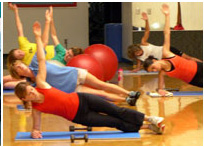 We all know finding the right balance between calories in and calories out is essential to weight loss. We also know the importance of incorporating both proper nutrition and exercise. Studies show that weight loss through diet alone is possible but not necessarily sustainable. This is because drastic dieting is not a life-long change and the lack of carbohydrate supplies can cause muscle degradation as your body literally feeds off itself. There is no way around it folks, if you want to make a change you need to sweat regularly and take an honest look at your diet.
We all know finding the right balance between calories in and calories out is essential to weight loss. We also know the importance of incorporating both proper nutrition and exercise. Studies show that weight loss through diet alone is possible but not necessarily sustainable. This is because drastic dieting is not a life-long change and the lack of carbohydrate supplies can cause muscle degradation as your body literally feeds off itself. There is no way around it folks, if you want to make a change you need to sweat regularly and take an honest look at your diet.The truth is, when it comes to losing weight exercising can sometimes be the "easy" part. Perhaps you've found a fun group fitness class your motivated to attend or your working with a personal trainer a few times per week and they rarely let you off the hook. Irregardless of the means, you've taken an important step in becoming a healthier individual. The only problem, despite your honest attempts at exercise the numbers on the scale refuse to budge. If this is the case, it's time to take a closer look at basic physiology and your caloric exchange.
As we increase exercise, a number of things happen that can effect the numbers on the scale. First, we are building lean muscle. In as little as 4-6 weeks we can measurably increase our muscle mass. Muscle is almost 20% more dense than fat. You can see how despite our clothes fitting better, an increase in muscle mass can "fool" the scale. In addition, water weight can actually increase for several weeks at the start of an exercise program. As our energy demands increase, our body may start storing additional water in order to help replenish glycogen stores. Water weight gain may have an even higher impact in people who were perpetually dehydrated prior to starting their exercise routine. Rest assured, after a few weeks our body realizes we are providing plenty of water and water retention will even itself out. I recommend using circumference measures around your waist and hips to help measure changes in your physique. If you insist on weighing yourself, do it no more than once a week at the same time, preferably first thing in the AM. Give your body a few weeks to adjust to the new demands your placing it under before putting it under the microscope.
Finally, we must be honest about our daily eating patterns and not use exercise as an excuse to consume more calories. Although moderate exercise has been shown to decrease appetite immediately following exercise (this is due to blood being redirected to our working muscles from our digestive system), some people may overcompensate at meal times. Honestly gauging portion sizes as well as calorie intake is essential.
I once had a client who came to me complaining about their lack of weight loss despite their hard core exercise routine. After probing him on specific details of his diet, he finally revealed he was drinking 2 high calorie protein shakes every morning and eating 2 peanut butter and jelly sandwiches for dinner. In addition, he was drinking a "recovery" drink after every workout that contained 300 calories per bottle. YIKES! Rest assured, our bodies are built to handle physical activity and as long as we have a well-rounded diet, and aren't a professional athlete; rarely do we need to "supplement" with extra protein, carbohydrate drinks, etc.. Mostly these are gimmicks that our body only ends up storing as fat.
The trick to not overcompensating on calories with additional exercise is to eat small sensible meals often. Yogurt is a great pre and post-workout snack providing calcium and protein. Throw in a little granola if you had an especially tough workout or need a little crunch. Fresh fruit is a great way to prime your tank without going overboard on calories. Try some low-fat soups with dinner to help fill you up before overindulging in your main dish. Need a special treat at night? Opt for a 100-calorie snack with a little bit of fat-free pudding. The key is to never go hungry so you don't risk the pitfall of overcompensating at meal times.
The most important aspect of weight-loss is to trust the science and make long-lasting changes. Give your bodies a chance to adapt to your new healthy lifestyle. Permanent change takes time both psychologically and physiologically. If your honest about your exercise and nutrition, you've been working out for eons and your weight still refuses to budge, stay tuned for my next post on getting out of an exercise rut.


